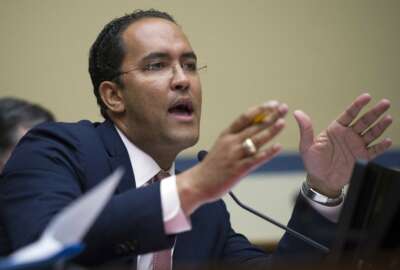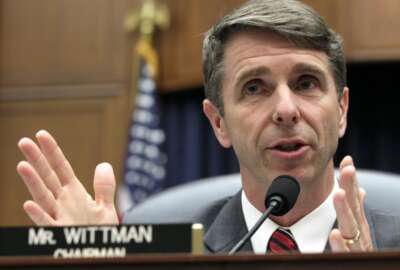
Congressman wants federal bonuses published
In today's Federal Newscast, Rep. Mark Sanford (R-S.C.) said the public should be able to see how much federal employees earn from performance bonuses.
To listen to the Federal Newscast on your phone or mobile device, subscribe on PodcastOne or Apple Podcasts. The best listening experience on desktop can be found using Chrome, Firefox or Safari.
- Rep. Mark Sanford (R-S.C.) introduced the Federal Employee Bonus Disclosure Act. It would require agencies to publicly disclose, document, and report details of individual federal employees’ bonuses to the Office of Personnel Management. Sanford said the public should be able to see how much federal employees earn from performance bonuses. (Rep. Mark Sanford)
- OPM told federal employees in the Washington, D.C. area to go to work two hours later than usual Thursday. OPM announced the delayed arrival Wednesday night. Federal employees also had the ability to take unscheduled leave or telework. The Baltimore Federal Executive Board also recommended agencies in its area open at 10 a.m. Thursday. (Federal News Radio)
- Congress appeared to have reached a deal on a $1.3 trillion spending package to fund the government until September. Lawmakers have until midnight Friday to approve it and prevent the year’s third government shutdown. The bill provides big spending increases for defense and domestic programs. (Federal News Radio)
- OPM is about to get a host of new reporting requirements around security clearances. The Senate passed the Securely Expediting Clearances Through Reporting Transparency or SECRET Act, which previously cleared the House. If President Donald Trump signs the bill, OPM will have 90 days to send its first quarterly report to Congress detailing data around 18 items, including a backlog mitigation plan. (Rep. Steve Knight)
- One lawmaker wants to create an independent national security commission on artificial intelligence. Rep. Elise Stefanik (R-N.Y.) introduced a bill to conduct a national review of advances in artificial intelligence. The commission would also address and identify national security concerns with respect to AI and provide near-term and annual recommendations until 2020. (Rep. Elise Stefanik)
- A new management plan gives the Navy and Marine Corps a lot more leeway to manage their own information technology. A memo from Thomas Modly, the new undersecretary of the Navy essentially did away with the office of the Department of the Navy CIO, the organization which has overseen IT policy for the Navy and the Marines up until now. From now on, most of the Navy and Marines’ IT responsibilities will be delegated to the services. Modly said the Navy Department will retain a skeleton staff in order to comply with federal law, and he will personally assume the role of the department’s CIO. (Federal News Radio)
- NASA has been without a permanent leader for more than 14 months and 60 members of the House are tired of waiting. A bipartisan group of legislators wrote to the Senate asking them to approve the nomination of Rep. Jim Bridenstine (R-Okla.). The letter has the support of all GOP members of the House Committee on Science, Space, and Technology, as well as most Republicans on the House Armed Services Committee. Bridenstine is a member of both committees. President Donald Trump nominated hime back in September. (Federal News Radio)
- Dr. Robert Redfield was nominated as the next director of the Centers for Disease Control and Prevention. Redfield is an infectious disease specialist and served on the President’s Advisory Council on HIV/AIDS under President George W. Bush. Redfield runs a treatment network in Baltimore for HIV and Hepatitis C patients, and served in the Army Medical Corps for 20 years. Department of Health and Human Services Secretary Alexander Azar said one of Redfield’s top priorities would be stopping the opioid epidemic. (HHS)
- The CDC has a new assignment, as a 20-year ban on research by the agency into gun violence will be lifted. The move is due to a set of provisions included in the omnibus spending bill in light of the Feb. 14 school shooting in Parkland, Florida. The provisions rewrite the so-called Dickey Amendment, which kept the CDC out of what amendment backers considered a contentious political issue. The rewrite lets the CDC study the public health effects of gun violence, but not advocate for gun control. (Rep. Stephanie Murphy)
- The IRS’s Taxpayer Advocacy Panel confirmed 25 new members. They joined 40 current members to make recommendations to improve customer service at the agency. The IRS chose its new members from a pool of more than 700 applications. National Taxpayer Advocate Nina Olson said the panel plays a major role in understanding taxpayers’ needs. Members of the Taxpayer Advocacy Panel serve three-year terms. (Internal Revenue Service)
- The National Institute of Standards and Technology updated its handbook to ensure networks and applications are resilient to cyber attacks based on the agency’s needs. NIST released the draft of Special Publication 800-160, volume 2, Wednesday for federal and private sector critical infrastructure providers. The engineering-based framework emphasizes that organizations should select, adapt and use some or all of the cyber resiliency goals, techniques, approaches, and design principles based on their operational and threat environments. The guidance is helpful for both new or legacy technology systems. NIST said the end goal is to help agencies take engineering-driven actions to develop more defensible and survivable systems. (National Institute of Standards and Technology)
- Customs and Border Protection said it has gotten better at onboarding new agents and officers and is getting more, and higher quality applicants to those positions. But union officials worried the administration is jumping ahead on plans for a border wall without resolving its personnel challenges first. National Border Patrol Council President Brandon Judd said CBP is making some improvements though. The Trump administration wants $38 billion for a border wall and technology. Lawmakers included only one point $6 billion for the project in its omnibus spending bill. (House Homeland Security Committee)
Copyright © 2025 Federal News Network. All rights reserved. This website is not intended for users located within the European Economic Area.
Eric White
Eric White is news anchor and Federal Drive producer at Federal News Network.
Follow @FEDERALNEWSCAST
Related Stories
Rep. Rob Wittman (R-Va.)/ AP photo/Carolyn Kaster





